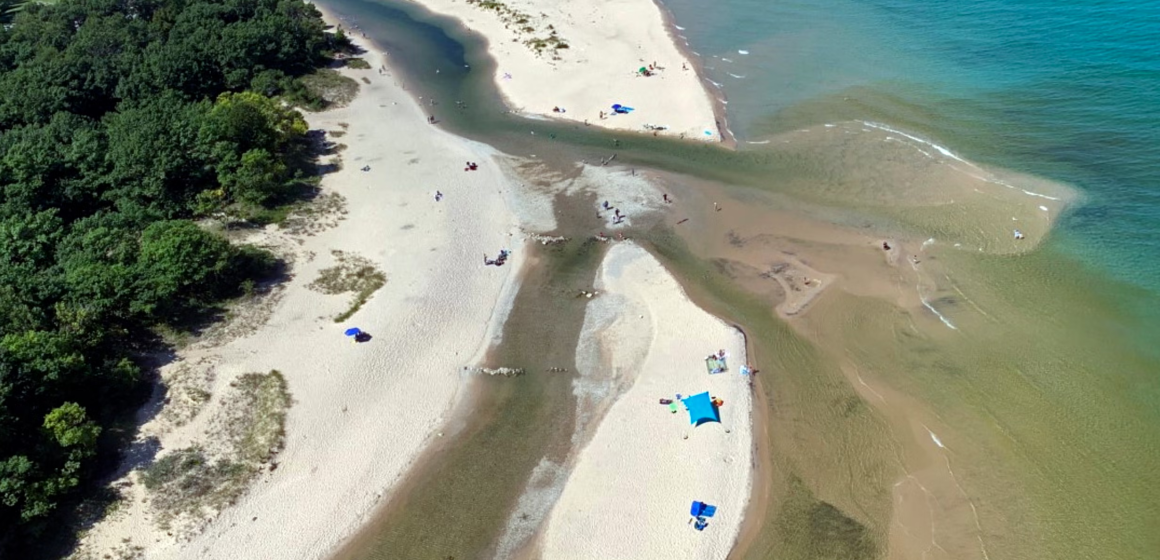A Michigan man has been sentenced to five years probation after being convicted of tampering with the natural flow of the Platte River at Sleeping Bear Dunes National Lakeshore. Andrew Blair Howard, 63, was found guilty of vandalism and tampering, actions that have led to significant penalties and a ban from all National Park Service properties.
Howard’s sentencing includes restitution payments of $22,472.22 to the National Park Service and the U.S. Coast Guard, along with an additional $3,947.71 related to court proceedings. His actions, which disrupted the natural environment of the popular lakeshore, have been widely condemned by both park officials and the legal community.
The incident occurred on August 15, 2022, when Howard took it upon himself to alter the Platte River’s course. He dug sediment and rocks from the river basin and stacked rocks on a dam, blocking the river’s natural flow.
This diversion redirected the water to a newly created channel leading to Lake Michigan. The modification was quickly noticed by National Park Service law enforcement officers, who received reports of the unusual activity near the river’s mouth.
U.S. Attorney Mark Totten addressed the situation in a statement, emphasizing the legal boundaries that Howard overstepped. “Mr. Howard had a policy dispute with the National Park Service over whether to dredge the Platte River.
Reasonable people can disagree on the best course of action, but Congress gave NPS the power to decide,” Totten said. “While Mr. Howard had the right to disagree and advocate for his position, he did not have the right to take the law into his own hands and force his favored result. Doing so was a misdemeanor, and this sentence holds Mr. Howard accountable for his offense.”
The sentence reflects the seriousness with which the legal system views such acts of environmental tampering. The National Park Service, responsible for preserving the natural beauty and ecological integrity of national parks, has strict regulations in place to prevent unauthorized alterations to landscapes and waterways. Howard’s actions not only disrupted the natural flow of the Platte River but also posed potential ecological risks to the area.
The restitution payments ordered by the court are intended to cover the costs incurred by the National Park Service and the U.S. Coast Guard in addressing and rectifying the damage caused by Howard’s actions. This financial penalty underscores the impact that such unauthorized interventions can have on public resources and the environment.
Howard’s ban from Park Service property is a further measure to prevent any future incidents. This prohibition is a significant consequence, given the widespread reach of National Park Service lands across the United States. It serves as a reminder that individuals who violate park regulations will face severe restrictions on their access to these cherished public lands.
The case has sparked discussions about the appropriate ways for individuals to engage in environmental advocacy and policy disputes. While public participation and advocacy are important components of democratic processes, Howard’s actions illustrate the line between lawful advocacy and illegal tampering.
The legal system, in this instance, has reinforced that policy disagreements must be resolved through appropriate channels rather than unilateral actions that harm public resources.
Sleeping Bear Dunes National Lakeshore, known for its stunning landscapes and recreational opportunities, attracts visitors from around the world.
The preservation of its natural state is crucial for maintaining its ecological health and ensuring that future generations can continue to enjoy its beauty. Incidents like the one involving Howard highlight the ongoing challenges faced by park authorities in balancing access and preservation.
As Howard begins his probation and faces the financial consequences of his actions, the case stands as a cautionary tale for others who might consider taking similar unauthorized measures. The court’s decision underscores the importance of respecting the laws and regulations designed to protect the environment and public lands.
Read more news:
- Detroit Police Hunt for Driver in Critical Hit-and-Run Incident
- Michigan Judge Lifts Barriers to Abortion Access with New Ruling



Leave a Reply